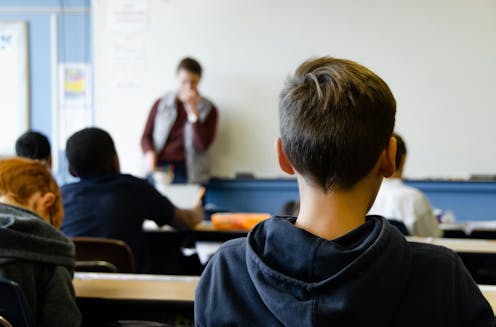Australian teenagers are curious but have some of the most disruptive maths classes in the OECD
- Written by Lisa De Bortoli, Senior Research Fellow, Australian Council for Educational Research

Australian teenagers have more disruptive maths classrooms and experience bullying at greater levels than the OECD average, a new report[1] shows.
But in better news, Australian students report high levels of curiosity which is an important for both enjoyment and achievement at school.
The report, by the Australian Council for Educational Research (ACER) analysed questionnaire responses from more than 13,430 Australian students and 743 principals, to understand how their school experiences impact on maths performance.
What is the research?
This is the second report exploring Australian data from the 2022 Programme for International Student Assessment[2] (PISA).
PISA examines how 15-year-old students are able to apply their knowledge in maths, reading and science for real-world problem solving. It is one of three major international tests Australia participates in. Students complete a computer-based test and a questionnaire.
A first report[3] released last December showed Australian students’ performance in maths has not changed significantly over the past seven years. However, when compared to when PISA results were first reported about 20 years ago, there has been a decrease of 37 points.
This new report compares 24 countries out of the 81 countries who did the PISA test. The 24 were chosen because they performed higher or at the same level as Australia in maths.
Are students listening to their teachers?
Students were asked to note how frequently students are not listening to the teacher, there is noise and students are distracted by digital devices. A “disciplinary climate index” was then constructed for each country.
While Japan had the most favourable climate, Australian students’ reported one of the least favourable among the comparison countries. All but two countries (Sweden and New Zealand) had a more favourable disciplinary climate than Australia.
Tasmania and the Northern Territory has the least favourable scores and Victoria and New South Wales had the best. For example, more students in Tasmania than in all other states and territories reported “there is noise and disorder in most classes”.
Being left out and made fun of
The study also created an “exposure to bullying index” by asking students how often certain things happened to them. This included “other students left me out of things on purpose,” “other students made fun of me,” “I was threatened by other students,” as well as acts of physical aggression.
Here, Australian students reported higher exposure to bullying than all comparison countries except Latvia. They also reported similar exposure to bullying as students in New Zealand and the United Kingdom.
Students in Tasmania reported the highest levels of bullying and those in Victoria reported the lowest.
However, Australian students’ exposure to bullying score decreased between this PISA and previous test in 2018.

















